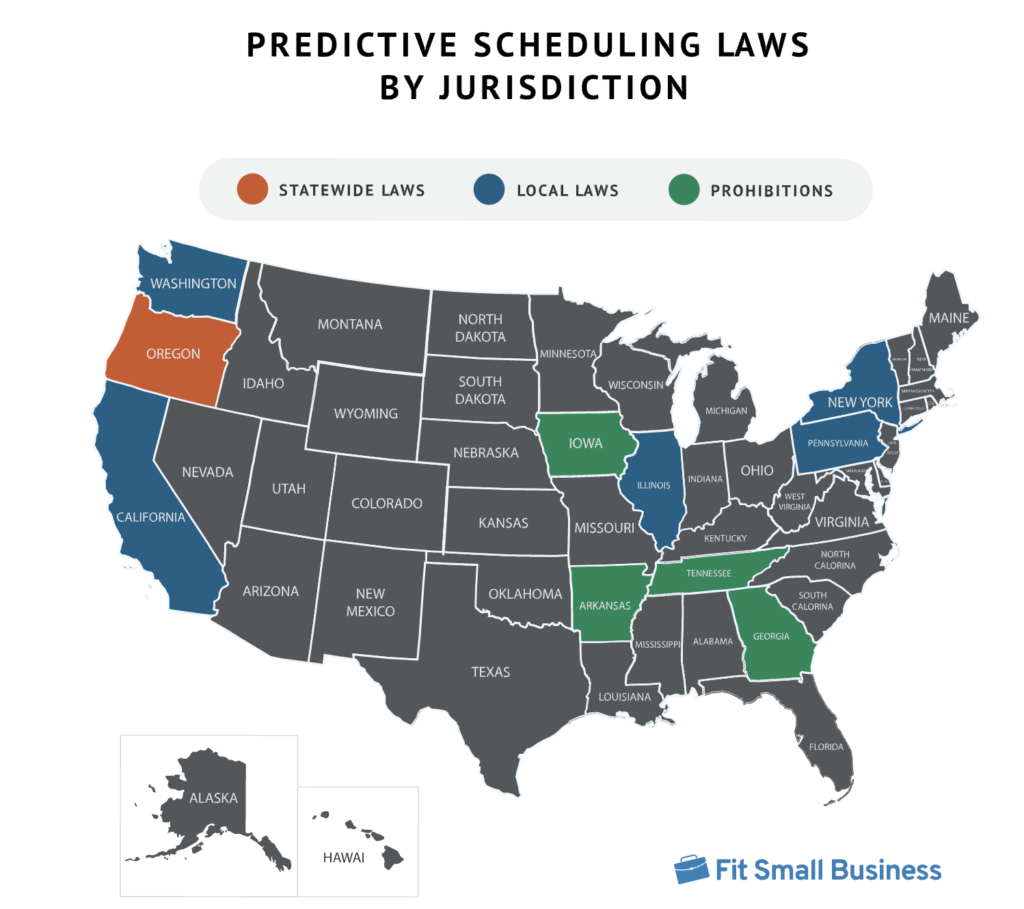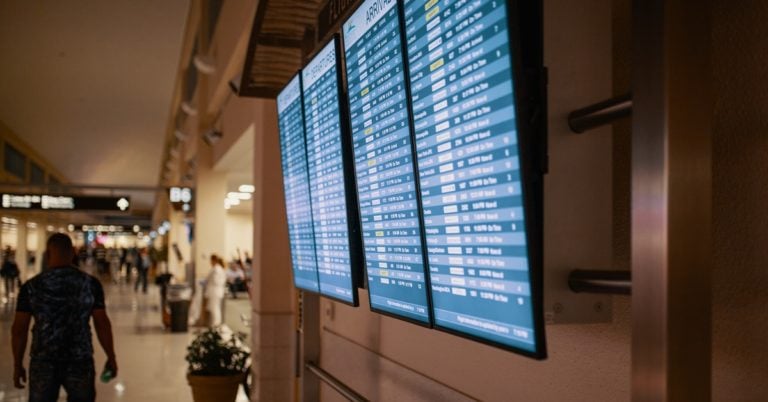Predictive scheduling laws can dictate how you create and publish schedules and plan for any last-minute changes but can also lead to confusion. We take you through predictive scheduling laws by state and your responsibilities as an employer.
As an employer, predictive scheduling laws may affect how you manage your employees’ work schedules.
There is no uniform predictive scheduling law at the federal level. Instead, predictive scheduling is mandatory in some states and cities. Some states have expressly legislated against the introduction of these types of laws. Others are silent on the issue.
This lack of uniformity can cause a headache for employers, especially those with employees in many states. To help you understand your obligations, let’s take a look at the predictive scheduling laws by state.
What Are Predictive Scheduling Laws?
Predictive scheduling laws aim to provide employees with a degree of certainty around their work schedules. They typically do this by giving employees the right to ask for flexibility with their hours and to refuse shift-change requests. They also place a range of obligations on employers, like other existing labor laws on changing employee schedules.
These include requiring employers to give employees advance notice of their schedule estimates. They can also restrict an employer’s ability to change schedules. Under many of these laws, employers must also pay employees a penalty for working shifts as a result of late employer-led changes. For example, in Oregon, employers must pay a worker an extra hour of wages if they reschedule a shift.
Predictive scheduling laws were first introduced to address employers’ reliance on on-call scheduling. This practice especially affected minimum wage earners in the hospitality industry. The laws aim to provide shift workers with a better work-life balance.
There are further obvious benefits to workers. Predictive scheduling laws provide a level of consistency that helps workers to manage childcare and their other work and personal commitments. In turn, this contributes to their job satisfaction and engagement.
This can lead to benefits for employers, too, such as increased productivity and reduced employee turnover. However, it also places extra requirements on those creating and managing work schedules.
Easily Plan Your Crystal Clear Work Schedule
Avoid scheduling conflicts and unnecessary costs with Connecteam’s easy-to-use, all-in-one scheduling app.
Understanding Predictive Scheduling Laws
Before we look at individual predictive scheduling laws, it helps to understand some common terms.
A good faith estimate is a reasonable prediction of an employee’s expected hours. In the context of predictive scheduling laws, a good faith estimate typically needs to be provided in writing. While not legally binding, it must be an honest estimate.
Predictability pay refers to extra pay to compensate employees for late changes to their schedules.
“Clopening” shifts are when an employee works the closing shift one day followed by an opening shift the next day. The regulation of clopening shifts often applies to retail and hospitality employers.
Each predictive scheduling law is complex and typically addresses a range of related topics. These include when and how a schedule needs to be published and the impact of collective bargaining agreements. They can also address record-keeping requirements and additional hours of pay.
Which States Have Predictive Scheduling Laws?

- Oregon
- New Hampshire (flexible working arrangements)
- Vermont (flexible working arrangements)
Oregon
Title: Fair Workweek Act
Effective date: July 1, 2018
Applies to: Hospitality, food service, and retail employers with 500 employees or more worldwide. Employees directly involved in hospitality, food service, or retail activities.
Oregon is the only location with state-wide predictive scheduling laws.
They apply to hospitality, food service, and retail employers with 500 employees or more worldwide. Covered employees are those directly involved in hospital, food service, or retail activities.
Requirements include the following:
- Employers must provide new employees with a good faith estimate of their schedule.
- Employers must give employees 14 days’ notice of their schedules.
- Schedules must be posted in a location where all employees can see them and must include both fixed and on-call shifts.
- Employers must give employees at least 10 hours between clopening shifts.
- If an employer asks an employee to change a shift after a schedule has been published, the employee can refuse it.
- Employees have the right to provide schedule availability, although an employer is not under any obligation to follow it.
The situations where employers owe predictability pay are as follows:
- If an employee agrees to work a clopening shift with less than a 10-hour break, the employer must pay them at 1.5 times their usual rate.
- An employer must pay an employee an extra hour at their regular rate if they
- extend the shift by at least 30 mins
- reschedule the shift
- add shifts to the schedule.
- An employer must pay an employee at a rate of 0.5 times their usual rate for each hour if they
- reduce or cancel a shift
- do not use an on-call employee.
New Hampshire
Title: NH Rev Stat § 275:37-b (2016) – Flexible Working Arrangement
Effective date: September 1, 2016
Applies to: All employers
New Hampshire does not have specific predictive scheduling laws. However, employees can request flexible working arrangements. While employers can deny these requests, they cannot retaliate against an employee because of them.
Vermont
Title: 21 V.S.A. § 309. Flexible working arrangements
Effective date: January 1, 2014
Applies to: All employers
Vermont does not have specific predictive scheduling laws. However, an employee has the right to request a flexible work schedule. This includes changes to the number of working hours, when they start or finish work, and working from home.
Employers must:
- consider and discuss these requests in good faith at least twice a year
- reply to any written requests in writing
- not retaliate against an employee for making a request.
Which Cities Have Predictive Scheduling Laws?
- Berkeley, California
- Emeryville, California
- San Francisco, California
- San Jose, California
- Chicago, Illinois
- New York City, New York
- Philadelphia, Pennsylvania
- Seattle, Washington
California
Berkeley
Title: Fair Workweek Employment Standards
Effective date: January 2023
Applies to: Employers in the building services, healthcare, hotel, manufacturing, retail, or warehouse service industries that employ at least 56 employees worldwide. Restaurants that employ at least 10 employees in Berkeley and at least 100 worldwide. Employees who earn less than double the minimum wage.
Under the recently approved Fair Workweek Employment Standards, employers must
- provide new employees with a written good faith estimate of their schedule before starting
- give employees 2 weeks’ notice of their work schedules
- first offer additional hours to existing part-time employees before hiring externally
- allow employees 11 hours between clopening shifts.
Employers must also provide the following predictability pay for schedule changes:
- 1 hour of pay for any changes made with less than 14 days’ but more than 24 hours’ notice.
- 1 hour of pay if a shift is changed (without a loss of hours) with less than 24 hours’ notice.
- up to 4 hours if a shift is canceled less than 24 hours before its start time.
If an employee agrees to work a clopening with less than an 11-hour break, the employer must pay them 1.5 times their regular rate for the second shift.
Berkeley’s Municipal Code also includes the Family Friendly and Environment Friendly Workplace Ordinance. This applies to employers with 10 or more employees. It covers employees who have worked for the company for at least 3 months at a minimum of 8 hours per week.
It gives employees the right to request a predictable or flexible work schedule. An employer must provide a written response to the request within 21 days.
Emeryville
Title: Fair Workweek Employment Standards
Effective date: January 1, 2018
Applies to: Retail employers with at least 56 employees worldwide. Fast food companies with at least 56 employees globally and at least 20 employees in Emeryville
Employers must
- provide new employees with a written good faith estimate of their work schedule
- give employees a good faith estimate of expected shifts at least 14 days in advance.
In addition to wages for hours worked, employers must also pay the following predictability pay for schedule changes:
- For changes made between 14 days and 24 hours of the shift: 1 hour of pay
- For changes made within 24 hours of the shift: either 4 hours’ pay or the number of hours in the shift, whichever is less
- For workers agreeing to work a clopening within 11 hours: 1.5 times the regular rate
Employees also the have right to ask for flexible working hours, including extra shifts and shift swaps.
San Francisco
Title: Formula Retail Employee Rights Ordinances
Effective date: July 3, 2015
Applies to: Retail employers with at least 40 locations worldwide and 20 employees in San Francisco. Retail employers include food and beverage providers, banks, and financial institutions.
Employers must
- offer current staff extra hours before hiring outside staff
- give new employees a good faith estimate of expected monthly shifts in writing, including the number of days and hours
- provide employees with a good faith estimate of their work schedule at least 14 days in advance
- pay employees 1-4 hours of predictability pay if the employer changes the schedule with less than 7 days’ notice.
San Jose
Title: Opportunity to Work Ordinance
Effective date: March 13, 2017
Applies to: Employers with at least 36 employees. These employers must either have premises in San Jose or be subject to the San Jose Business License Tax.
Employers must offer extra hours to current part-time employees before recruiting new employees. There are exceptions to this, including where it would cause hardship to the employer.
Illinois
Chicago
Title: Fair Workweek Ordinance
Effective date: July 1, 2020
Applies to: Employers in the building services, healthcare, hotel, manufacturing, restaurant, retail, or warehouse service industries. Employers must have at least 100 employees worldwide (250 employees for non-profits). To be covered, restaurants must have at least 30 locations globally.
It includes the following requirements:
- Employers must give new employees a good faith estimate of their expected work schedule in writing for the first 3 months of employment.
- Employers must give employees a good faith estimate of expected shifts at least 14 days in advance.
- Employees can decline shift changes after this time.
- If an employer changes a shift with less than 2 weeks’ notice, they must pay the employee 1 hour of predictability pay.
New York
New York City
Title: Fair Workweek Law
Effective date: May 30, 2017
Applies to: Retail employers with at least 20 employees and employees whose primary work duties involve the sale of consumer goods. Fast-food companies with at least 30 locations worldwide.
The requirements for retail employers include the following:
- Employers must give employees at least 72 hours’ notice of their schedule.
- Employers cannot schedule on-call shifts.
- Employers cannot cancel a shift or require an employee to work with less than 72 hours’ notice.
Fast-food employers must
- provide employees with schedules with predictable, recurring weekly shifts
- give employees at least 2 weeks’ notice of their schedule
- pay employees $100 predictability pay to work clopening shifts.
If an employer changes a shift after giving notice of the schedule, various rates of premium pay apply to different types of changes. For example, if the employer gives an employee less than 24 hours’ notice that they have to work extra hours, they must pay them $75.
Pennsylvania
Philadelphia
Title: Fair Workweek Employment Standards
Effective date: April 1, 2020
Applies to: Employers in the retail, hospitality, or food services sectors. Must have 250 or more employees and at least 30 locations globally.
Employers must
- give new employees a good faith estimate of their work schedule in writing
- give employees written notice of their work schedule at least 2 weeks in advance
- pay employees predictability pay for any schedule changes with less than 2 weeks’ notice, at the rate of
- 1 hour per change, where the change does not result in a loss of hours
- 0.5 hours for any subtracted or canceled hours
- allow employees 9 hours between shifts
- pay employees $40 for each missed 9-hour rest period.
Employees have the right to
- request flexible work schedules, including not being scheduled at certain times or for on-call shifts
- decline any extra shifts not already in their work schedule.
Washington
Seattle
Title: Secure Scheduling Ordinance
Effective date: July 1, 2017
Applies to: Employers in the retail or food service sectors with at least 500 or more employees globally. Full-service restaurants must also have at least 40 worldwide locations.
It includes the following requirements:
- Employers must offer current employees extra hours before hiring externally.
- When hiring, employers must give new employees a good faith estimate of expected work hours.
- Employers must provide a good faith estimate of expected shifts at least 2 weeks in advance.
- Employees can decline any changes to the schedule after the notice period.
- Employees have the right to make requests in relation to flexible schedules.
- Employees must have a 10-hour break between shifts.
An employer owes varying amounts of predictability pay if they change a schedule after the 2-week notice period. For example, if an employer changes the start or end time of the shift (without losing hours), they must pay the employee 1 hour of pay.
Which States or Cities May Introduce Predictive Scheduling Laws?
The following have either considered or are considering predictive scheduling laws at the state level:
- Connecticut
- Illinois
- Maine
- Michigan
- Minnesota
- New Jersey
- North Carolina
- Rhode Island
Which States or Cities Prohibit Predictive Scheduling Laws?
Some states prohibit local governments from introducing predictive scheduling laws. These are:
- Arkansas
- Georgia
- Iowa
- Tennessee
Predictive Scheduling Law Compliance
Step 1: Understand the law
The first step to compliance is understanding your legal obligations as an employer. You should seek legal advice on this. This is especially important if you have offices in various locations as different rules and exceptions may apply.
It’s also important to keep track of the relevant laws as they often change. Other locations may later introduce their own predictive scheduling laws.
Step 2: Ensure your business practices are compliant
Once you understand the law, you can develop the necessary policies and business practices to ensure you remain compliant. If necessary, these need to be adapted to suit employees in different locations. As predictive scheduling laws regularly change, it’s important to review your processes and policies so they remain up to date.
Consider creating template forms for publishing schedules and requesting changes. These can be adapted to suit applicable predictive scheduling laws and your workforce.
Step 3: Provide training
You should also consider providing training on predictive scheduling laws. This is relevant to your HR and payroll departments and particularly managers. For compliance purposes, it’s essential your managers know when they can change an employee’s schedule, how to do it, and any consequences of it.
Step 4: Use a scheduling app
The easiest way to create and share employee schedules is via a scheduling app. This ensures your employees have access to their work schedules as soon as they’re published.
Try the #1 All-in-One Employee Scheduling App
Automatically avoid scheduling conflicts and manage, share, and update your employees’ schedules from one central location. Use Connecteam’s AI scheduler to fairly assign open shifts based on employee availability, preferences, and qualifications in just seconds.
Know Your Predictive Scheduling Laws
As an employer, there is a range of employment laws you need to understand and comply with. Predictive scheduling law requirements are one part of this.
Check to see whether you have employees in a state or city with predictive scheduling laws. Then, get to know them—the laws are complex and the above is only an overview of some of your obligations. You can then adapt your policies and business practices to ensure compliance and avoid any penalties.
This article is for informational purposes only and is not intended as legal advice. It’s important you seek legal advice relevant to your business’s situation.
Frequently Asked Questions
What if employees request to work extra shifts?
Predictive scheduling laws prevent employers from forcing employees to work unexpected shifts. However, some allow employees to request or voluntarily accept extra shifts.
Take note that many laws apply predictability pay requirements regardless of who initiates the change. This means you must provide predictability pay for any change made after the relevant notice period, even if the employee requests it.
Are there any exceptions to predictive scheduling laws?
There are some exceptions to predictability pay under certain predictive scheduling laws. For example, if employees voluntarily swap shifts or agree to go on a stand-by list to be called in as needed, predictability pay may not apply.
Check the predictive scheduling laws that apply to you and your employees to confirm if any exceptions are available to you.
What happens if you don’t comply with predictive scheduling laws?
If you do not follow the applicable law requiring employers to provide predictive scheduling, you may face administrative or civil proceedings. This usually results in fines.
Employees can often also sue employers for violating their rights under the relevant law. As well as any penalties, employers can be ordered to pay the employee any extra wages they are owed, as well as their attorney fees and court costs.



